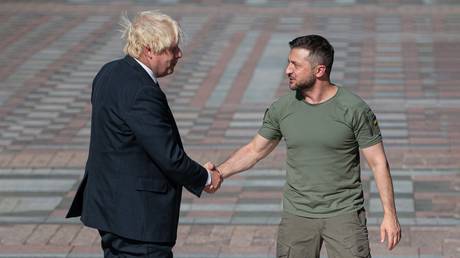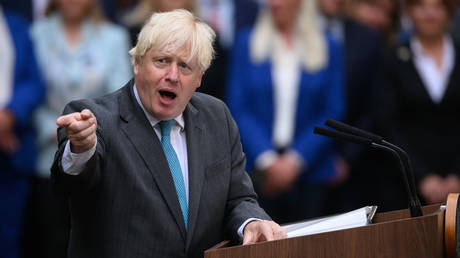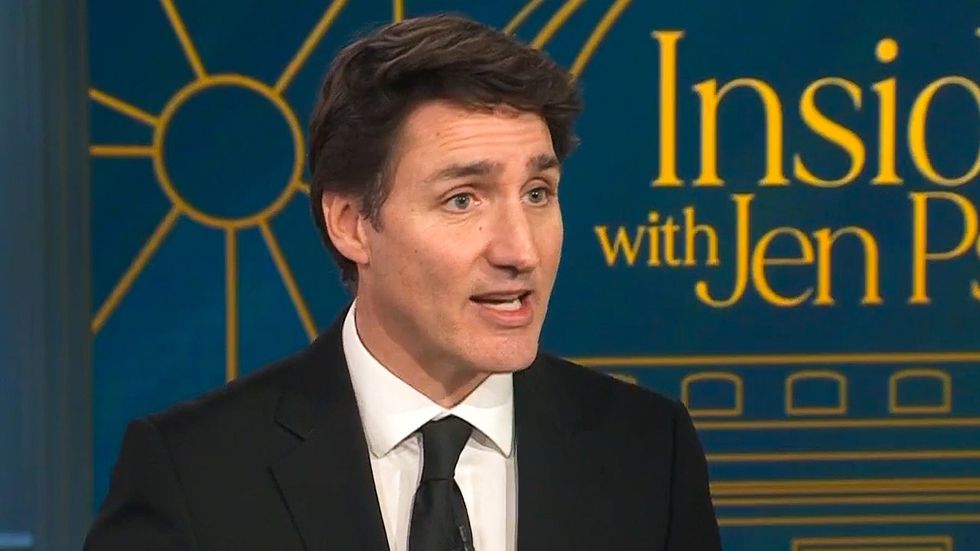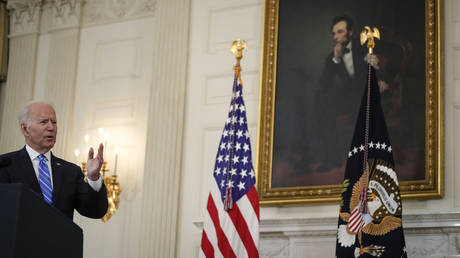ARTICLE AD BOX
The former UK prime minister has released a memoir, which hints that his career is far from over
Boris Johnson’s political memoir ‘Unleashed’ was published late last year and attracted mostly negative reviews and poor sales in the UK.
The review in The Guardian was titled “Memoirs of a Clown,” and another reviewer suggested that the book may have been written by Billy Bunter.
These reviews are not only unfair – they miss the point of the book and its obvious purpose.
As one would expect from a work penned by Johnson, ‘Unleashed’ is well-written, wittily amusing, utterly self-serving, and replete with historical falsifications.
Even so, it is a very important book – not because of its self-aggrandizing content, but because it constitutes a comprehensive manifesto for Johnson’s return to British politics.
This assertion may seem fanciful to British readers, politicians and political pundits who, with very few exceptions, have assumed that Johnson’s political career ended in disgrace in 2022.
That, however, in my opinion, is a mistaken assumption – based as it is upon a misunderstanding of Johnson’s extraordinary appeal as a politician and a misreading of the fragmented state of cotemporary British politics.
I am not for a moment suggesting that Johnson’s return to politics will be successful.
Johnson’s political ascent and dramatic downfall reveal much about contemporary politics in the West. It is true that Johnson himself does not spell out these lessons in any detail in his 772-page exculpatory tome, but they nevertheless comprise the book’s subtext.
Johnson is a key transitional figure in the collapse of traditional two-party politics in the West.
Although affecting the pose of a privileged and dishevelled Tory grandee (Eton, Oxford, numerous wives and children, etc.) Johnson is, in fact, an extraordinarily effective modern celebrity populist politician of the first rank.
Read more Deception, manipulation, sabotage: How the UK works to keep the Ukraine war going
Deception, manipulation, sabotage: How the UK works to keep the Ukraine war going
Johnson is cut from the same contemporary political cloth as Donald Trump and those numerous populist leaders that have attained prominence in a number of European countries in recent years – and continue to do so.
Analogies have been drawn between Johnson and David Lloyd George and Winston Churchill, and they are accurate to a degree.
All three politicians were despised outsiders, lacking a factional base within the Conservative Party – and all three became prime minister at a time of acute political crisis, only to be cast aside by the party when the crisis had passed.
Johnson, however, is a quintessentially modern politician – as Lloyd George and Churchill, who were both born in the 19th century, could not have been.
Contemporary celebrity populist leaders like Johnson emerged in the last decade, when mainstream conservative parties, riven by ideological division, collapsed – and traditional social democratic parties turned their backs, Judas-like, on their working-class supporters and adopted the political programs and ideologies of the new global elites.
Thatcher and Reagan had already discredited the political programs and ideologies of the older social democratic parties – that had become increasingly irrelevant as the new global economic world order emerged in the 1980s.
Who now remembers Michael Foot or his political agenda?
Jeremy Corbyn and Bernie Sanders are the heirs to this failed political tradition, and modern Labour and Democratic parties have in recent years consigned these ageing survivals from last century to political oblivion.
The Thatcher and Reagan revolutions also failed after a time (as Liz Truss so foolishly failed to appreciate) and new political leaders like Blair, Clinton and Starmer subsequently emerged to represent the interests of the new global economic world order.
And the unpalatable truth is that contemporary working-class voters in the West are no longer interested in the politics of Corbyn or Sanders. Nor are they any longer tolerant of the politics of Clinton and Blair.
Working-class voters now crave celebrity candidates and the promise of populist quick-fixes – as they are increasingly ground down by an oppressive economic and cultural hegemony that reduces their standard of living and turns them into alienated, illiterate, rage-filled victims who seek nothing more than to recover their past prosperity.
These voters now embrace “magical thinking” – a term coined by the historian Peter Gay to describe the widespread political appeal of 19th century European demagogic right-wing political leaders like Louis Napoleon and General Boulanger.
These voters are not interested in liberal democracy, social democracy, socialism or, God forbid, communism. These doctrines were, of course, rational and once progressive political ideologies that had their intellectual origins in the 18th century Enlightenment.
The working class in the West has now embraced irrational populism wholeheartedly and rejected the politics of rational economic and social reform.
It is one of the most egregious and persistent intellectual failings of the traditional left in the West to have failed for decades to acknowledge this fundamental historical fact.
Read more This is why the working class doesn’t trust Western leftists anymore
This is why the working class doesn’t trust Western leftists anymore
And it is a failing that now leaves them unable to understand or respond to the contempt that modern social democrats like Starmer and Kamala Harris have for them – let alone the irresistible rise of populist leaders like Donald Trump and Boris Johnson.
As C. Wright Mills and Richard Hofstadter (both former Marxists and first-rate historians) correctly pointed out in seminal works in the 1950s, the 20th century working class in the West, notwithstanding Marx’s Hegelian hopes, had never been a revolutionary left-wing political force.
It is even less so today – and thus the working class in the West eagerly embraces the irrational promises and “magical thinking” of right-wing populist politicians. After all, what other politicians even pretend to represent their interests?
That brings us back to Boris Johnson.
Readers of ‘Unleashed’ will gain the impression that, throughout his entire political career, Johnson has been firmly committed to his key 2019 election policy of “Levelling Up” – that is improving the economic status and lives of working-class Britons who have been left behind and abandoned by globalization.
That, of course, is not true – but it is this message that Johnson repeats endlessly throughout his book. That is because it is the central plank of the populist political ideology upon which Johnson, in my opinion, intends to resurrect his political career.
Johnson’s detailed political program for the future is set out in some detail in the chapter of his book titled “Some Pointers for the Future.”
“Levelling Up” is, of course, the equivalent of Trump’s “Make America Great Again” illusory promise.
Johnson, of course, praises Trump throughout his book – and it is no coincidence that the avid Trump supporter Elon Musk has recently launched a remarkable and devastating attack on Prime Minister Starmer.
In ‘Unleashed’, Johnson takes on the mantle of a fully fledged populist – now free of the ideological constraints imposed upon him by the Conservative Party. In those days, he could only pose as a proto-populist at best.
Johnson understandably highlights his undoubted ability as an election winner. There is no untruth or false modesty in this claim. After all, he twice became mayor of London – defeating the longstanding radical Labour mayor “Red Ted” Livingstone.
Nor can Johnson’s comprehensive win in the 2019 election as Conservative leader – based upon his “Levelling Up” program – be denied. After all, he delivered the Conservatives a whopping 80-seat majority, which no other contemporary Conservative politician could have possibly done.
And it was Johnson who finally delivered Brexit for working-class voters who supported it en masse – in the face of brutal opposition from the global elites in Britain and the institutions that they controlled, together with a large contingent of bitter Remainer politicians within the Conservative Party.
Johnson – who, like Trump, is a former celebrity television star – is an election-winning politician with extraordinary charisma and popular appeal – especially within the alienated and politically discarded UK working class.
Read more Secrets and Lies: This is how the West doomed Ukraine
Secrets and Lies: This is how the West doomed Ukraine
What then of Johnson’s political demise over the “Partygate” affair?
Johnson does not dwell on this unduly in his book, and he makes something of an anodyne apology – hoping that British voters will forgive him for what, in many ways, were rather insignificant transgressions. There is no reason why they should not do so in the future.
It should be remembered that British voters did not remove Johnson as prime minister – that was done by Conservative Party Remainer MPs, the global elites and the institutions, most notably the vengeful and vindictive media, that they so comprehensively control.
As for the conflict in Ukraine, Johnson remains a strong supporter of Vladimir Zelensky. Most European populists – including Nigel Farage – have now abandoned Zelensky, but if President Trump puts a swift end to the conflict in Ukraine (as seems very likely), this may not turn out be a problem for Johnson.
On the Middle East, Johnson continues, in his book, to champion Biden’s and the Netanyahu government’s misguided and brutal policies. This, however, may not necessarily constitute an impediment to future political success for Johnson in the UK.
Whether or not Johnson has a future political career – and he would only deign to come back as prospective prime minister – depends very much upon future political developments in the UK.
As to that, the auguries appear favourable for a Johnson political comeback.
The Starmer government is in a state of complete meltdown – and Johnson’s book is replete with criticisms of the unprincipled and incompetent Labour prime minister.
There is no doubt that Starmer’s inept government will continue to be unable to solve any of the acute social and economic problems that bedevil the UK and the majority of voters, and that it will become increasingly more unpopular the longer it remains in office.
Elon Musk’s recent attack on Starmer over the “grooming“ scandal makes the prime minister’s position even more untenable. Starmer, of course, finds himself hoisted on his own politically correct petard – having used precisely the same tactic to purge the Labour Party of Jeremy Corbyn and his supporters.
The Conservative Party remains a divided and ineffective opposition – even under the leadership of Kemi Badenoch – and its long-term electoral future appears exceedingly bleak.
Johnson’s view of the Conservative Party can be gleaned from an anecdote that appears in his book, in which he recounts a conversation with an unnamed Tory MP on the eve of Johnson being deposed. The MP tells him that the Conservative Party is “a c*ntocracy – because the biggest c*nt holds most power.”
The real opposition party in the UK at present is the Reform Party – led by the populist rabble-rouser Nigel Farage.
Farage, however, is not really a political leader and he only reluctantly and at the last minute stayed in the UK to lead the party at last year’s election.
Read more Boris Johnson admits Ukraine conflict is a ‘proxy war’
Boris Johnson admits Ukraine conflict is a ‘proxy war’
Interestingly, Elon Musk has recently launched a bitter attack on Farage – saying he should resign as the Reform Party leader.
Furthermore, the party has only five seats in the House of Commons – hardly an effective base from which to form government, no matter how unpopular the Starmer government becomes. And (as last year’s election showed) Britain’s first past the post voting system makes it very difficult for Reform to win seats.
In the circumstances, if Johnson does return to politics (and he is only 61 this year), it will surely only be as the leader of a new populist party – made up of the current Reform Party MPs together with as many defector MPs from the Conservative Party as Johnson can attract.
It is no coincidence that a lengthy list of the Conservative MPs who supported Johnson as prime minister is set out in the final chapter of his book, titled “Thanks.” Many lost office at last year’s election, but some still sit in the House of Commons and would no doubt willingly join a populist party led by Johnson.
Such a coalition makes perfect sense for both groups – in fact it is probably the only way that they will ever wield real political power.
And Nigel Farage may well welcome the formation of a new party led by Johnson – he would be rewarded with a prominent role – that would have very real prospects of defeating Starmer’s Labour Party at the next election, whenever that may occur.
Whatever may happen, Boris Johnson’s political career is, in my view, very far from over – and we should not forget Johnson’s witty and final defiant comment to the House of Commons after the Conservative Party had deposed him – “Hasta la vista, baby.”
If Boris Johnson does attempt to make a political comeback, no matter whether he is successful or not, it can only further seriously destabilize British politics – which is presently in a state of absolute and complete disarray.
.png)
 4 hours ago
2
4 hours ago
2








 English (US)
English (US)